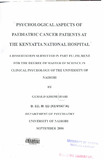| dc.description.abstract | To establish the psychological status of paediatric cancer patients at Kenyatta
National Hospital
A cross sectional descriptive study of children with cancer at Kenyatta
National Hospital. The study duration was from 2ih April 2005 to 26th April 2006.
Kenyatta National Hospital; Kenya's largest referral and teaching hospital.
The parents of 63 study cases and who gave consent were interviewed
using a prepared questionnaire. The inclusion criteria consisted of tissue confirmed
diagnosis of patients, admitted in the oncology unit and paediatric wards of Kenyatta
National Hospital having children with cancer. The exclusion criteria were patients with
diagnosed primary mental disorder. Those cases younger and older than the 4-16 years
age category were also excluded from the study. The variables documented included sex,
age, place of residence, family characteristics, cancer and treatment (s) modalities.
Screening for psychological aspects was done using the child behaviour Checklist and
behaviour profile which were scored using manual developed for that purpose and
subjected to DSM - IV TR. Data analysis was done using the non-parametric chi-square
test procedure. The analysis of the overall data was done using SPSS and the findings
reported in the form of tables, diagrams, charts, and percentages.
According to age categories of the child behaviour checklist the study showed
that 76% of cases were aged between 6 and 11 years while 18% were 4 and5 years old.
Only 6% were in the 12-13 years age group. A mean age of 8 years was found. Of these
62% were males while 38% were females with male to female ( M:F) ratio of 1:6: 1. The
significant finding from the study was that the older children were more likely to have
higher psychological morbidity, which was positively associated with low SES, unlike
other socio-demographic factors. Lack of religious affiliation in the family and single
parenthood were not found to. be risk factors for developing child psychopathology. The
current study found majority (98%) of the study cases as having come from families
practising religion and parents staying together. Other than age and low SES, the other
factors studied including family type level of formal education and alcohol use of parents
and history of mental illness in the family did not show a statistically significant relation
with psychological morbidity (PM). Chemotherapy causing alopecia and surgery leading
to visible scars was found to increase morbidity (P=O.Ol). A high positive correlation
(r=0.84) was found between the neoplasia and the severity of psychological morbidity.
The prevalence was found to be 84% as identified with the use of child behaviour
checklist and the behaviour profile. It was also found that 16% of the study cases did not
show clinical psychological morbidity.
The study showed that there was PM of 84% of psychological disorders in
children with cancer, with severity as being slight (10%), mild (30%) and,
moderate (40%).
The morbidity observed in the study cases was in the clinical level warranting therapeutic
intervention. The morbidity was positively correlated with low SES of families of the
study cases. Also older cases' in the age group 6 - 11 years appeared to show increased
morbidity as captured in the behaviour checklist.
Recommendation: The results of this study highly suggest that further study be carried
out involving more centres, hospitals and cases so as to avail more information needed by
psycho-oncology health staff to manage paediatric psychopathology in hospitals or
clinics caring for children with cancer. Research is also necessary to identify
exacerbating and ameliorating factors of the psychopathology in children suffering from
cancer. Parents of such children with cancer should also be involved so as to equip them
with skills enabling them and their children to cope with cancer. | en |
| dc.description.department | a
Department of Psychiatry, University of Nairobi, ; bDepartment of Mental Health, School of Medicine,
Moi University, Eldoret, Kenya | |


